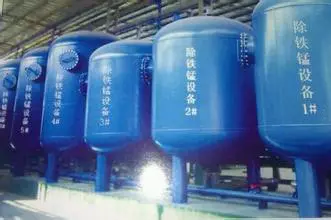Water Treatment Industry


Pressure vessels and storage tanks are pivotal components in the Water Treatment Industry, serving as cornerstones in various processes crucial for purifying and distributing clean water. Here's a comprehensive exploration of their applications within this sector:
1. Filtration Systems:
Pressure vessels are essential elements of water filtration systems, encompassing sand filters, multimedia filters, and activated carbon filters. These vessels house filter media that effectively trap impurities and contaminants from water as it traverses through. The maintained pressure within ensures optimal flow rates, guaranteeing thorough filtration and yielding potable water.
2. Reverse Osmosis (RO) Systems:
Within RO water treatment systems, pressure vessels encase semi-permeable membranes responsible for separating dissolved solids and impurities from water under high pressure. These vessels sustain the requisite pressure, propelling water through the membranes to produce purified water while excluding contaminants. RO systems are instrumental in desalination, converting seawater into drinking water, and purifying wastewater.
3. Ion Exchange Systems:
Pressure vessels find application in ion exchange systems, crucial for removing ions and minerals from water via chemical exchange processes. These vessels accommodate ion exchange resins that selectively extract undesirable ions like calcium, magnesium, and heavy metals. The applied pressure ensures efficient contact between water and resin, facilitating ion exchange and water softening.
4. Chlorination and Disinfection:
Storage tanks are employed for storing and dosing disinfectants such as chlorine or chloramines in water treatment facilities. Ensuring a consistent supply, these tanks facilitate the effective elimination of harmful microorganisms and pathogens from water. Proper disinfection is paramount for upholding water quality and mitigating waterborne diseases.
5. pH Adjustment and Chemical Dosing:
Storage tanks function as reservoirs for chemicals used in pH adjustment, coagulation, flocculation, and other treatment processes. They facilitate precise chemical dosing into water, ensuring optimal treatment conditions. Pressure vessels may also feature in chemical dosing systems, guaranteeing accurate and consistent chemical injection rates.
6. Sedimentation and Settling Tanks:
Within water treatment plants, sedimentation tanks allow suspended particles and solids to settle out from water. Storage tanks may serve as settling tanks for storing settled sludge before further treatment or disposal. Pressure vessels may enhance sedimentation efficiency and reduce footprint in such processes.
7. Distribution and Storage:
Storage tanks store treated water prior to distribution to consumers or industrial facilities. Ensuring a constant supply of clean water, these tanks are vital during peak demand. Pressure vessels may regulate water flow and maintain optimal pressure levels within distribution systems.
Pressure vessels are essential elements of water filtration systems, encompassing sand filters, multimedia filters, and activated carbon filters. These vessels house filter media that effectively trap impurities and contaminants from water as it traverses through. The maintained pressure within ensures optimal flow rates, guaranteeing thorough filtration and yielding potable water.
2. Reverse Osmosis (RO) Systems:
Within RO water treatment systems, pressure vessels encase semi-permeable membranes responsible for separating dissolved solids and impurities from water under high pressure. These vessels sustain the requisite pressure, propelling water through the membranes to produce purified water while excluding contaminants. RO systems are instrumental in desalination, converting seawater into drinking water, and purifying wastewater.
3. Ion Exchange Systems:
Pressure vessels find application in ion exchange systems, crucial for removing ions and minerals from water via chemical exchange processes. These vessels accommodate ion exchange resins that selectively extract undesirable ions like calcium, magnesium, and heavy metals. The applied pressure ensures efficient contact between water and resin, facilitating ion exchange and water softening.
4. Chlorination and Disinfection:
Storage tanks are employed for storing and dosing disinfectants such as chlorine or chloramines in water treatment facilities. Ensuring a consistent supply, these tanks facilitate the effective elimination of harmful microorganisms and pathogens from water. Proper disinfection is paramount for upholding water quality and mitigating waterborne diseases.
5. pH Adjustment and Chemical Dosing:
Storage tanks function as reservoirs for chemicals used in pH adjustment, coagulation, flocculation, and other treatment processes. They facilitate precise chemical dosing into water, ensuring optimal treatment conditions. Pressure vessels may also feature in chemical dosing systems, guaranteeing accurate and consistent chemical injection rates.
6. Sedimentation and Settling Tanks:
Within water treatment plants, sedimentation tanks allow suspended particles and solids to settle out from water. Storage tanks may serve as settling tanks for storing settled sludge before further treatment or disposal. Pressure vessels may enhance sedimentation efficiency and reduce footprint in such processes.
7. Distribution and Storage:
Storage tanks store treated water prior to distribution to consumers or industrial facilities. Ensuring a constant supply of clean water, these tanks are vital during peak demand. Pressure vessels may regulate water flow and maintain optimal pressure levels within distribution systems.
